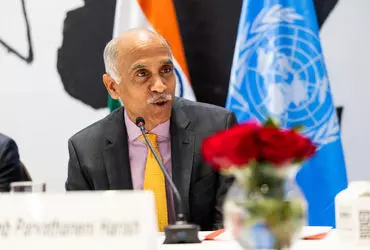Gaza peace deal 'landmark' step towards stability in Middle East: India

United Nations: The recently signed Gaza Peace Agreement is a “landmark” step towards stability in the Middle East, India has said, reiterating that a two-state solution remains “the only pragmatic path” to achieving durable peace between Israel and Palestine. Speaking at the United Nations Security Council’s quarterly open debate on the situation in the Middle East on Thursday, India’s Permanent Representative to the UN, Ambassador Parvathaneni Harish, said, “It is India's earnest desire to realise the vision of a stable and peaceful Middle East... deprivation and indignity cannot be part of daily life; civilians must not die due to conflict." India stands fully ready to contribute to this endeavour, he said. Harish said New Delhi hoped the “positive diplomatic momentum” generated by the peace summit in Sharm el-Sheikh earlier this month would lead to “lasting peace in the region”. Welcoming the signing of the "landmark" peace deal, the envoy lauded the US, "especially" President Donald Trump, for playing an instrumental role in forging the deal, and also commended Egypt and Qatar for their contributions. Reiterating India's longstanding position, Harish said, "The two-state solution is the only pragmatic path." "Now is the time for all parties to support ongoing peace efforts, rather than to derail them," he said.
India has consistently advocated a sovereign, independent, viable State of Palestine, living side by side in peace and security with Israel, within secure and recognised borders. "Dialogue and diplomacy, and the two-state solution, are the means to achieve peace. The landmark initiative of the United States has generated diplomatic momentum towards peace, and all parties must adhere to their obligations in this regard," Harish said, adding that India is firmly opposed to any unilateral moves by parties concerned. The ambassador recalled that since the October 7, 2023 conflict, India had consistently condemned terrorism, called for an end to civilian suffering, demanded the release of hostages, and stressed the need for unimpeded humanitarian aid to Gaza. He said India viewed the new peace agreement as “an enabler and a catalyst” for these objectives. "The short-term gains of the recent diplomatic outcomes must pave the way for medium to long-term political commitments and practical action on the ground towards the realisation of a two-state solution," he said. Underscoring India's support for the Palestinian people's right to self-determination, the envoy referred to last month's UN high-level conference on implementing the two-state solution, saying it had “underlined the way forward”. On the humanitarian front, Harish noted that India had extended over USD 170 million in total support to Palestine, including USD 40 million worth of ongoing projects and 135 metric tons of medicines and relief supplies in the past two years. “Palestinian people cannot rebuild their lives without the support of the international community,” he said, calling for the creation of economic frameworks conducive to investment and employment. "Peace and calm on the Palestinian front have implications for the wider region... Talks must continue and there must be abiding faith in the efficacy of dialogue and diplomacy," Harish said.
Harish also touched upon broader regional issues, including Syria, Lebanon, and Yemen, underlining India’s continuing humanitarian and peacekeeping contributions. On Syria, he reaffirmed India’s backing for a “Syrian-led, Syrian-owned political process” and paid tribute to Brigadier General Amitabh Jha, who was killed while serving as Acting Force Commander of the United Nations Disengagement Observer Force (UNDOF) in December 2024. India is the third-largest troop contributor to UNDOF. He also stressed the safety of UN peacekeepers in Lebanon, where India is the second-largest contributor to UNIFIL (United Nations Interim Force in Lebanon), and expressed hope that the Lebanese Armed Forces would soon take full control once the mission’s sunset clause takes effect in 2026. Harish also called for an “immediate cessation of hostilities” in Yemen to allow humanitarian aid to reach civilians, saying such assistance “must be above politics”.



